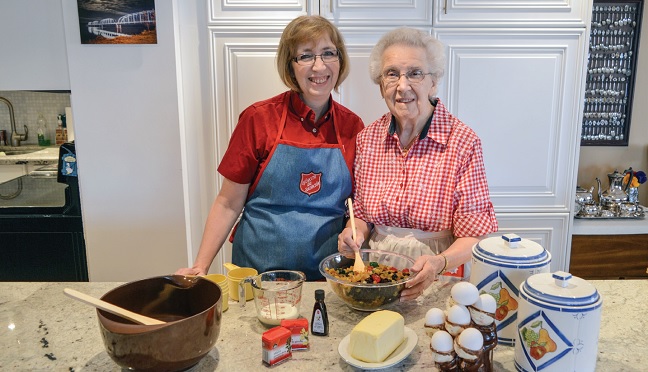There's something about the smell of fresh bread. It draws me into a bakery faster than you can count to three. It's a good thing I don't work in a bakery—I'd want to sample all the wares! But at Christmas, baking is a family tradition. I remember watching my mom make all kinds of goodies for events at our corps and visiting guests.
Special breads are a tradition at Christmastime around the world. I learned to eat rosca de reyes in Mexico, pan de Pascua in Chile and pan dulce in Argentina. In Germany, the bread for Christmas is stollen, while Italy boasts panettone (which is similar to the Argentinian pan dulce). In Norway, you'll find Julekake, fruit bread flavoured with cardamom. Babovka, in the Czech Republic, has a poppy seed filling. If you're wondering why bread is a Christmas tradition, read on.
This fall, I had the amazing adventure of visiting the Holy Land. One of the highlights for me was Bethlehem, best known as the birthplace of Jesus Christ. Did you know that Bethlehem dates back to Canaanite times—probably the third millennium BC—when it was named Beit Lahama, after a Canaanite fertility god? The city was conquered by the Philistines, then Israel, then the Greeks and the Romans, who dominated the whole region at the time of Jesus' birth. By then, it was called Bet Lehem in Hebrew, meaning “house of bread.” In Arabic, the name has a similar sound: Beit Lahm, which means “house of meat.” Both translations imply a region of fertility and prosperity, a place where people won't go hungry.
God chose for Jesus to be born in Bethlehem, the house of bread. Jesus would later refer to himself as the Bread of Life. He said: “I am the Bread of Life. Whoever comes to me will never go hungry, and whoever believes in me will never be thirsty” (John 6:35).
We often think of hunger as the last straw of poverty, that when the poor have lost everything else, they go without food. Yet that's just not the case in North America today. In urban centres, many people still have a roof over their heads, but their children go to school without breakfast. Single mothers make sure their kids have food, but often go without themselves. Sometimes people are unable to afford healthy food, but you would never know their bodies are starving for the right nutrients.
Poverty and hunger aren't always visible. The Salvation Army in Canada and Bermuda is working to end poverty and make sure no one goes hungry.
Spiritually, many go hungry as well. They fill up on things, but have no room for the Bread of Life. They seem to prosper in the eyes of the world, but find life empty. Scripture says: “You're going to find that there will be times when people will have no stomach for solid teaching, but will fill up on spiritual junk food—catchy opinions that tickle their fancy. They'll turn their backs on truth and chase mirages” (2 Timothy 4:3-4 The Message).
This Christmas, as you make or eat bread or other baked goods, remember that Jesus came to be our Bread of Life. “The Bread of God came down out of heaven and is giving life to the world” (John 6:33 The Message). Are you spiritually hungry? Are you dissatisfied with life, even though you seem to have things under control? Don't let this Christmas go by without sharing in the Bread of Life, Jesus Christ, the Son of God and Saviour of the world.
Commissioner Susan McMillan is the territorial commander of the Canada and Bermuda Territory. Follow her at facebook.com/susanmcmillantc and twitter.com/salvationarmytc.
Special breads are a tradition at Christmastime around the world. I learned to eat rosca de reyes in Mexico, pan de Pascua in Chile and pan dulce in Argentina. In Germany, the bread for Christmas is stollen, while Italy boasts panettone (which is similar to the Argentinian pan dulce). In Norway, you'll find Julekake, fruit bread flavoured with cardamom. Babovka, in the Czech Republic, has a poppy seed filling. If you're wondering why bread is a Christmas tradition, read on.
This fall, I had the amazing adventure of visiting the Holy Land. One of the highlights for me was Bethlehem, best known as the birthplace of Jesus Christ. Did you know that Bethlehem dates back to Canaanite times—probably the third millennium BC—when it was named Beit Lahama, after a Canaanite fertility god? The city was conquered by the Philistines, then Israel, then the Greeks and the Romans, who dominated the whole region at the time of Jesus' birth. By then, it was called Bet Lehem in Hebrew, meaning “house of bread.” In Arabic, the name has a similar sound: Beit Lahm, which means “house of meat.” Both translations imply a region of fertility and prosperity, a place where people won't go hungry.
God chose for Jesus to be born in Bethlehem, the house of bread. Jesus would later refer to himself as the Bread of Life. He said: “I am the Bread of Life. Whoever comes to me will never go hungry, and whoever believes in me will never be thirsty” (John 6:35).
We often think of hunger as the last straw of poverty, that when the poor have lost everything else, they go without food. Yet that's just not the case in North America today. In urban centres, many people still have a roof over their heads, but their children go to school without breakfast. Single mothers make sure their kids have food, but often go without themselves. Sometimes people are unable to afford healthy food, but you would never know their bodies are starving for the right nutrients.
Poverty and hunger aren't always visible. The Salvation Army in Canada and Bermuda is working to end poverty and make sure no one goes hungry.
Spiritually, many go hungry as well. They fill up on things, but have no room for the Bread of Life. They seem to prosper in the eyes of the world, but find life empty. Scripture says: “You're going to find that there will be times when people will have no stomach for solid teaching, but will fill up on spiritual junk food—catchy opinions that tickle their fancy. They'll turn their backs on truth and chase mirages” (2 Timothy 4:3-4 The Message).
This Christmas, as you make or eat bread or other baked goods, remember that Jesus came to be our Bread of Life. “The Bread of God came down out of heaven and is giving life to the world” (John 6:33 The Message). Are you spiritually hungry? Are you dissatisfied with life, even though you seem to have things under control? Don't let this Christmas go by without sharing in the Bread of Life, Jesus Christ, the Son of God and Saviour of the world.
Commissioner Susan McMillan is the territorial commander of the Canada and Bermuda Territory. Follow her at facebook.com/susanmcmillantc and twitter.com/salvationarmytc.










Comment
On Thursday, December 15, 2016, Elizabeth J Roby said:
Leave a Comment